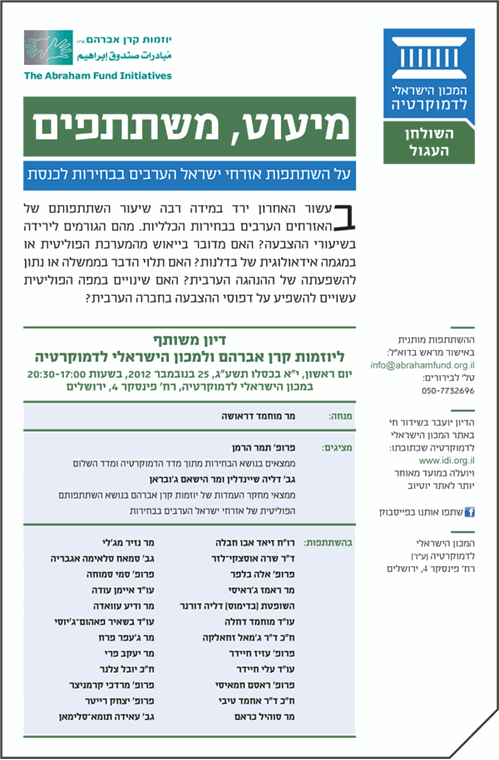Roundtable on Arab Israeli Voter Turnout
The Israel Democracy Institute | 4 Pinsker Street | Jerusalem
This roundtable was conducted jointly by IDI and the Abraham Fund Initiatives.
The upcoming Israeli elections mark a crucial juncture for Israel, and indeed for the entire Middle East. Given the stakes involved and the backdrop of the Arab Spring, one would expect Israel's Arab citizens to turn out in high numbers. Yet, the rate of participation of Israeli Arabs in recent elections in Israel has markedly decreased. Given that Arabs make up 20% of Israel's population, this is a matter of great concern both for Israel's Arab population and for Israeli democracy as a whole.
Why are fewer Israeli-Arabs exercising their right to vote? Is it an expression of estrangement from the political system? A reflection of an ideological commitment to isolationism? Can this trend be countered by the Israeli government or influenced by Arab Israeli leadership? Is there a connection between lack of political participation and inequality?
On Sunday November 25, 2012, these and other questions were addressed at a roundtable on Arab Participation in the Israeli Elections that was convened by IDI and the Abraham Fund Initiatives. This event opened with a presentation of findings from the Israeli Democracy Index and the Peace Index, and a presentation of findings of research on political participation of Israeli Arabs commissioned by the Abraham Fund Initiatives.
The roundtable was broadcast live on the IDI website and can be viewed on this page or on the IDI YouTube channel (Hebrew).
Moderator: Mr. Mohammad Darawshe
Presenters:
Prof. Tamar Hermann, IDI Senior Fellow
Findings from the Israeli Democracy Index and the Peace Index
Ms. Dahlia Scheindlin and Mr. Hisham Jubran
Findings of research on political participation of Israeli Arabs commissioned by the Abraham Fund Initiatives
Participants:
Mr. Ziyad Abou Habla
Mr. Wadea Awawdy
Prof. Ella Belfer
Attorney Mohammed Dahleh
Justice (Emer.) Dalia Dorner
Adv. Basha'er Fahoum-Jayoussi
Mr. Jafar Farah
Prof. Aziz Haidar
Mr. Ali Haider
Prof. Tamar Hermann
Mr. Ramez Jeraisi
Mr. Suhail Karam
Prof. Rassem Khamaisi
Prof. Mordechai Kremnitzer
Mr. Nazir Mgally
Adv. Ayman Odeh
Dr. Sarah Ozacky-Lazar
Mr. Jacob Perry
Prof. Yitzhak Reiter
Ms. Samah Salima-Agbaria
Ms. Aida Touma-Sliman
Prof. Sammy Smooha
MK Dr. Ahmad Tibi
MK Dr. Jamal Zahalka
MK Yuval Zellner
Prof. Tamar Hermann, Academic Director of IDI's Guttman Center for Surveys, kicked off the debate with a presentation of research findings on Arab Israeli attitudes towards the state. Despite the recent decline in Arab participation in national elections, Prof. Hermann reported that two-thirds of the Arab population in Israel express some sense of belonging to the State of Israel. In addition, 44% of Israel's Arab citizens consider themselves to be "very proud" or "fairly proud" to be Israeli – a finding that emerged repeatedly in surveys since 2003. In contrast, however, Prof. Hermann noted that when Israeli Jews are asked how Israeli Arabs feel, the Jews indicate that they think Israeli Arabs do not feel that they are part of the State
Following Prof. Hermann's presentation, Mr. Hisham Jubran and Ms. Dahlia Scheindlin presented the findings of an Abraham Fund study that focused on Arab-Israeli voting rates in the 2009 Knesset elections and expected voting patterns in 2013. According to their research, only 28% of Israeli Arabs who are eligible to vote were found to be "persistent voters" who find it important to vote in the general elections. An additional 15% were classified as "weak voters" and 17% reported that they did not vote in the 2009 elections but are not ruling out the possibility that they will vote in 2013. An additional 34% of respondents were classified as "not strong voters.
Prof. Sammy Smooha, a sociologist from Haifa University who directs the Arab-Jewish Relations Index (a joint project of Haifa University and IDI), pointed out that the 53% turnout of Arab Israelis in the 2009 election was not necessarily low given their alienation from the state. He suggested that raising the electoral threshold to the Knesset would force the Arab parties to unite.
MK Ahmad Tibi, Chairman of the Ta'al party, lamented the declining participation of Arab voters, claiming that it is largely due to "despair, frustration, and nonchalance." He also blamed the government for failing to encourage the Arab vote. MK Tibi, a Deputy Speaker of the Knesset, said that the Arab vote is crucial to ensuring representation of Israel's minorities, saying they must be encouraged to take part in the electoral process. "Recently, the Government Publications Office has launched a campaign to encourage voting – but it is directed at the Jewish [Hebrew-speaking] public," noted Tibi. "The budget of the Government Publications Office is a public budget, which is supposed to be divided proportionally between the two sectors."
IDI Vice President of Research Prof. Mordechai Kremnitzer warned that a further deterioration in Arab voting rates in the upcoming general elections would lead to a loss of political power in the Arab sector. Noting the crucial role Arab MKs have played in blocking illiberal legislative initiatives in the 18th Knesset, Prof. Kremnitzer also cautioned of the dangers of a diminished Arab political presence in the next Knesset. "[I]t is a disgrace that the Zionist parties do not have an agenda for the Arab public.... There are all the reasons in the world to encourage...the Arab vote, as a force to safeguard democracy," he said.

